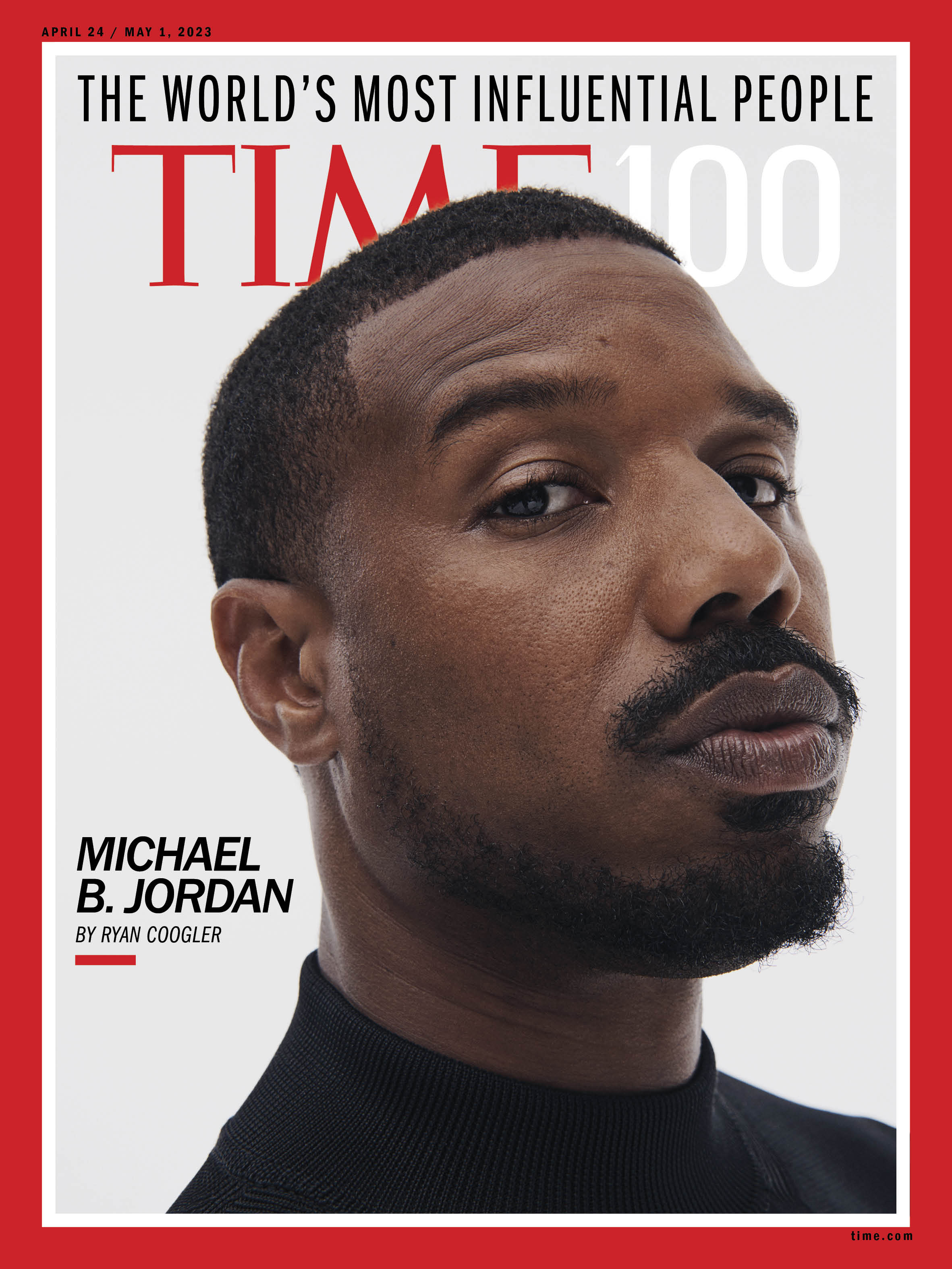It’s a big deal when any director’s debut movie sells $100 million worth of tickets in its first week. It’s an even bigger deal when that director is also the star. And it’s a triumvirate of big deals when that normal-sized star transformed plausibly into a heavyweight boxer to play the role. But that’s the position in which Michael B. Jordan, 36, finds himself in the wake of Creed III, which is either the third installment of the Creed franchise or the ninth installment of the Rocky franchise, depending on your age.
Despite the many hard yards that being a director-leading man-athlete entails, Jordan, one of TIME‘s 100 most influential people of 2023, is raring to get back in the directing ring again. “I got the bug. I love it. I’m looking forward to the next time sitting behind the camera,” says the star. He was sufficiently nervous about his first attempt that he called up such actor-directors as Bradley Cooper, Denzel Washington, and Jon Favreau to get tips on how to multitask, handle the unknown, and say action and cut when you’re in the middle of a scene.
There’s a reason Jordan took such control of the future of the Creed storyline. It was personal for him. “I had something to say. I had a unique opportunity to play a character three times over the past nine years, and have a character that was going through similar things that I was personally, and finding ways to work through my own sh-t through a character,” he says. “As an actor, you try to find characters that you can pull yourself into, and you can relate to, and you can almost kind of use that as like a therapeutic opportunity. And Adonis Creed was that for me.”
In this iteration of the movie, Creed is in an arc of his of life where things are going extraordinarily well. “At this point in his career, I kind of know what somebody like that will be going through, because I’m kind of going through that same sh-t,” says Jordan. “It was something that I knew nobody else could tell but me. So it was a perfect fit.”
Like Creed, Jordan has fame, respect, and enough money to buy everything he needs and wants and to look after those around him. After his first real paydays, for The Wire and Hardball, his mom took him to a car lot near where he lived in New Jersey and he bought a BMW330 CI, stick shift. More recently, he bought his mom a house. Like Creed, people expect a lot of him. (He recently was invited to dinner with President Obama and executives from his film production company.) And like Creed, he regularly has to drive by large billboards of himself modeling fancy clothing, or at least, fancy underpants. “It’s kind of out of out of body experience,” he says of seeing huge images of himself in Calvin Kleins. “It’s just like, wow, that’s a lot. That’s a lot, being up there.”
Finally, just like Creed, Jordan’s on the receiving end of a lot of people’s opinions about his work. While he appreciates the critical and popular acclaim the film has garnered, he tries to keep his circle of influencers pretty tight. “I don’t think the human brain is really built for millions and millions of opinions,” he says. “Humanity in general, you’re used to your tribe, you know, 20-30 people, that you care about: your family, your friends, and that extended group.” But he acknowledges that social media is tough to ignore. “You have to filter through and listen to people that you don’t know and their opinion shouldn’t really affect you like that, but it does.”
Read More: Michael B. Jordan Is Redefining What It Means to Be a Movie Star
Jordan had already leaned into his own rising influence with his 2018 pledge to use inclusion riders, which are clauses in contracts that call for more diversity among the cast and crew, for any film his company produces. But he’s looking for more permanent commitments. “I think you have a lot of corporate America checking boxes to satisfy the people or outcry or a moment,” he says. “And sometimes that energy is lost, as people forget. You get back to business as usual.”
Having been a working actor since his teens, Jordan has had some time to metabolize what it means to be someone people look up to, even though he says influence is not something that he sought. “It’s something that, for me anyway, I had to learn how to accept,” he says. And just as when he worked on Creed, he’s not shying from the heavy lifting. “I think I’ve accepted my role as a leader—and all the weight that comes with that.”

More Must-Reads from TIME
- Donald Trump Is TIME's 2024 Person of the Year
- Why We Chose Trump as Person of the Year
- Is Intermittent Fasting Good or Bad for You?
- The 100 Must-Read Books of 2024
- The 20 Best Christmas TV Episodes
- Column: If Optimism Feels Ridiculous Now, Try Hope
- The Future of Climate Action Is Trade Policy
- Merle Bombardieri Is Helping People Make the Baby Decision
Contact us at letters@time.com